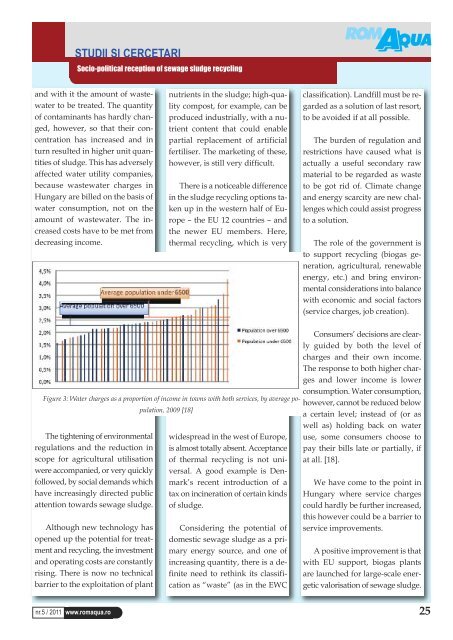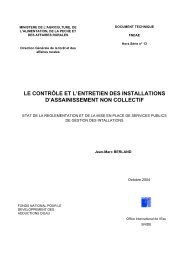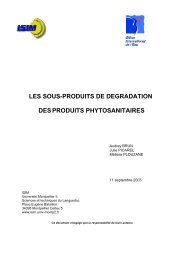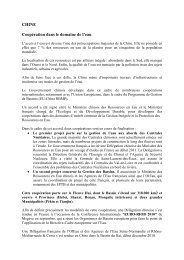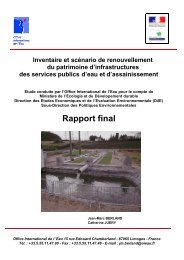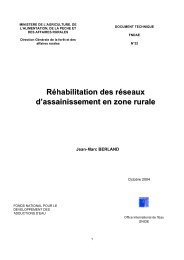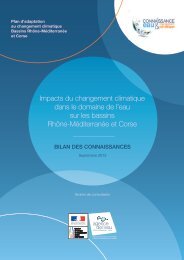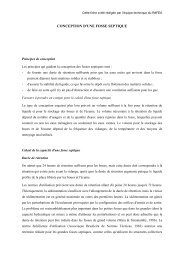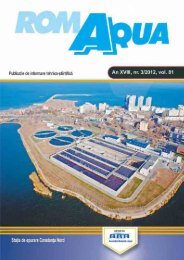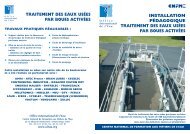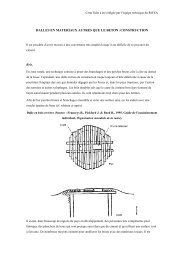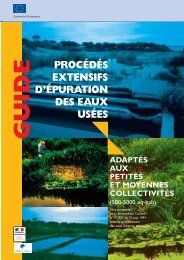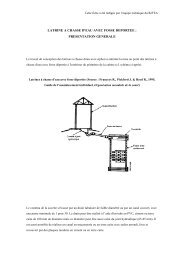vol 77 n° 5 2011 - Office International de l'Eau
vol 77 n° 5 2011 - Office International de l'Eau
vol 77 n° 5 2011 - Office International de l'Eau
You also want an ePaper? Increase the reach of your titles
YUMPU automatically turns print PDFs into web optimized ePapers that Google loves.
STUDII SI CERCETARI<br />
socio-political reception of sewage sludge recycling<br />
and with it the amount of wastewater<br />
to be treated. The quantity<br />
of contaminants has hardly changed,<br />
however, so that their concentration<br />
has increased and in<br />
turn resulted in higher unit quantities<br />
of sludge. This has adversely<br />
affected water utility companies,<br />
because wastewater charges in<br />
Hungary are billed on the basis of<br />
water consumption, not on the<br />
amount of wastewater. The increased<br />
costs have to be met from<br />
<strong>de</strong>creasing income.<br />
nutrients in the sludge; high-quality<br />
compost, for example, can be<br />
produced industrially, with a nutrient<br />
content that could enable<br />
partial replacement of artificial<br />
fertiliser. The marketing of these,<br />
however, is still very difficult.<br />
There is a noticeable difference<br />
in the sludge recycling options taken<br />
up in the western half of Europe<br />
– the EU 12 countries – and<br />
the newer EU members. Here,<br />
thermal recycling, which is very<br />
classification). Landfill must be regar<strong>de</strong>d<br />
as a solution of last resort,<br />
to be avoi<strong>de</strong>d if at all possible.<br />
The bur<strong>de</strong>n of regulation and<br />
restrictions have caused what is<br />
actually a useful secondary raw<br />
material to be regar<strong>de</strong>d as waste<br />
to be got rid of. Climate change<br />
and energy scarcity are new challenges<br />
which could assist progress<br />
to a solution.<br />
The role of the government is<br />
to support recycling (biogas generation,<br />
agricultural, renewable<br />
energy, etc.) and bring environmental<br />
consi<strong>de</strong>rations into balance<br />
with economic and social factors<br />
(service charges, job creation).<br />
Figure 3: Water charges as a proportion of income in towns with both services, by average population,<br />
2009 [18]<br />
The tightening of environmental<br />
regulations and the reduction in<br />
scope for agricultural utilisation<br />
were accompanied, or very quickly<br />
followed, by social <strong>de</strong>mands which<br />
have increasingly directed public<br />
attention towards sewage sludge.<br />
Although new technology has<br />
opened up the potential for treatment<br />
and recycling, the investment<br />
and operating costs are constantly<br />
rising. There is now no technical<br />
barrier to the exploitation of plant<br />
wi<strong>de</strong>spread in the west of Europe,<br />
is almost totally absent. Acceptance<br />
of thermal recycling is not universal.<br />
A good example is Denmark’s<br />
recent introduction of a<br />
tax on incineration of certain kinds<br />
of sludge.<br />
Consi<strong>de</strong>ring the potential of<br />
domestic sewage sludge as a primary<br />
energy source, and one of<br />
increasing quantity, there is a <strong>de</strong>finite<br />
need to rethink its classification<br />
as “waste” (as in the EWC<br />
Consumers’ <strong>de</strong>cisions are clearly<br />
gui<strong>de</strong>d by both the level of<br />
charges and their own income.<br />
The response to both higher charges<br />
and lower income is lower<br />
consumption. Water consumption,<br />
however, cannot be reduced below<br />
a certain level; instead of (or as<br />
well as) holding back on water<br />
use, some consumers choose to<br />
pay their bills late or partially, if<br />
at all. [18].<br />
We have come to the point in<br />
Hungary where service charges<br />
could hardly be further increased,<br />
this however could be a barrier to<br />
service improvements.<br />
A positive improvement is that<br />
with EU support, biogas plants<br />
are launched for large-scale energetic<br />
valorisation of sewage sludge.<br />
nr.5 / <strong>2011</strong> www.romaqua.ro<br />
25


